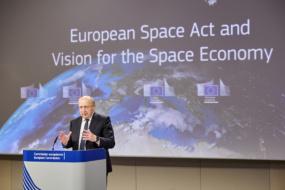Scotland’s space program is making moves to encourage a more sustainable approach to spaceflight. Space Scotland has published a roadmap to grow its space sector in a sustainable way through strategically funding greener space technologies. The ultimate goal: reaching net zero emissions and space debris neutrality by 2045.
Scotland in space: The country’s space initiatives have had an eye on sustainability, both on Earth and in orbit, for a while now.
- Scotland is currently developing the Space Hub Sutherland spaceport for small satellite launches, which it says will be the world’s greenest spaceport.
- Multiple Scottish companies are heads-down developing more eco-friendly rockets and fuels, including Orbex, Skyrora, and HyImpulse Technologies.
Scotland aims to grow its nascent space industry significantly over the next few decades. Space Scotland aims to create 20,000 jobs in the space sector by the end of the roadmap term, and set aside a £4B ($4.6B) share of the global space economy for its domestic space industry.
Carrots and sticks: The sustainability roadmap is divided into short-term goals to complete by 2025, and medium- and long-term goals to complete by 2035 and 2045, respectively.
The short-term goals are primarily focused on funding more eco-friendly space technologies to cut down emissions from the space sector. The Scottish government plans to offer domestic space companies carrots (incentives and funding awards for developing greener technologies to use in space and for complying with sustainability guidelines) and sticks (penalties for not complying).
Also in the short term, Space Scotland said it plans to join the Net Zero Space initiative, unveiled during last year’s Paris Peace Forum. The plan is to cut emissions by 50% by 2030 and reach net zero by 2045.
In the medium term, Scotland aims to solidify many of its sustainability guidelines into legislation. That would include making the Inter-Agency Space Debris Coordination Committee (IADC) and UN Committee on the Peaceful Uses of Outer Space (COPUOS) guidelines legally binding for Scottish companies.
Long term, on top of reaching net zero emissions from the space sector, Space Scotland is also targeting “space debris neutrality.” That means that by 2045, for every launch that creates debris, an equal amount of debris from past Scottish launches will be removed from orbit.




